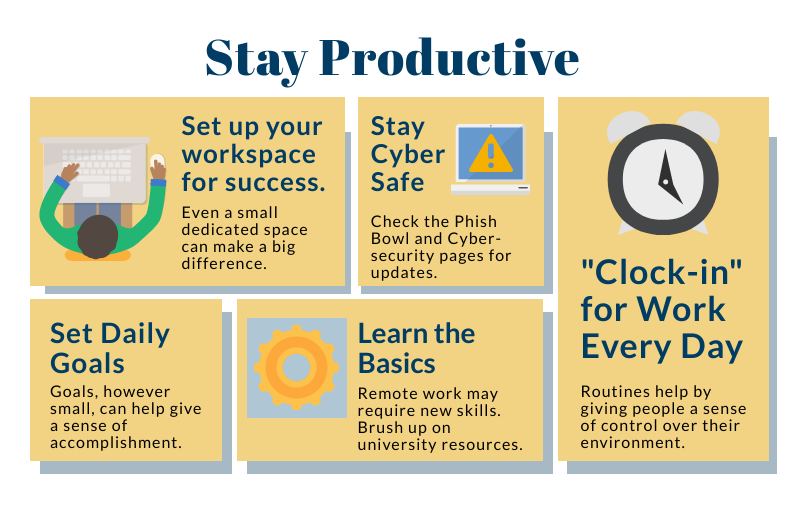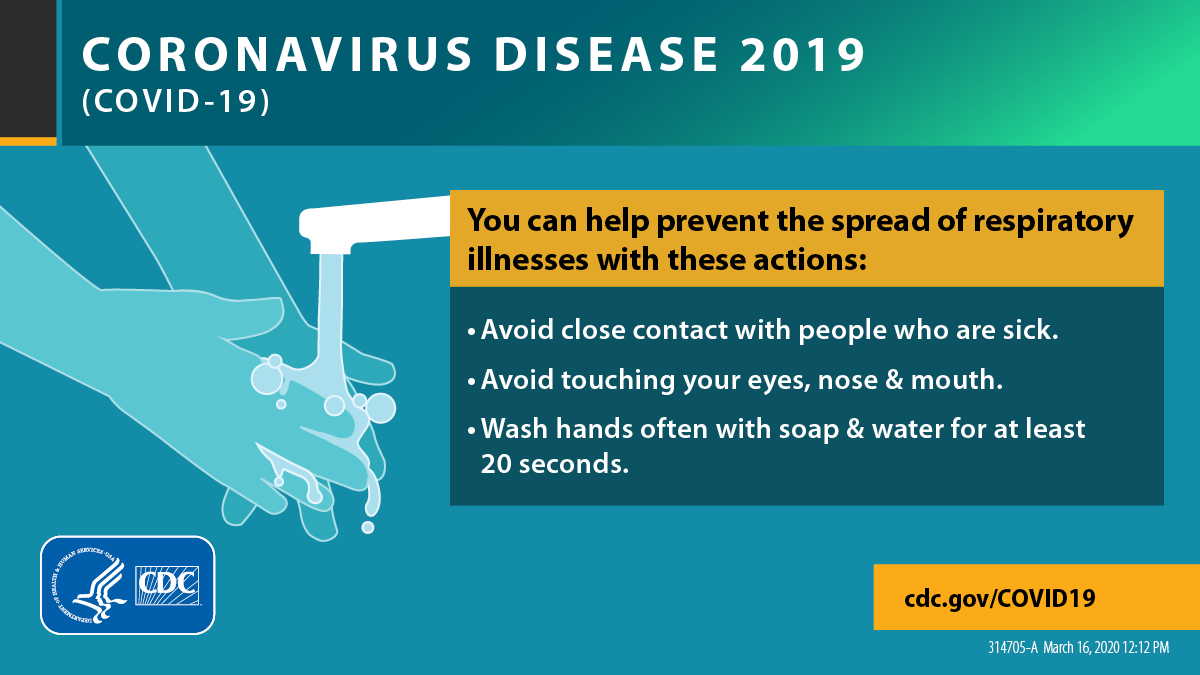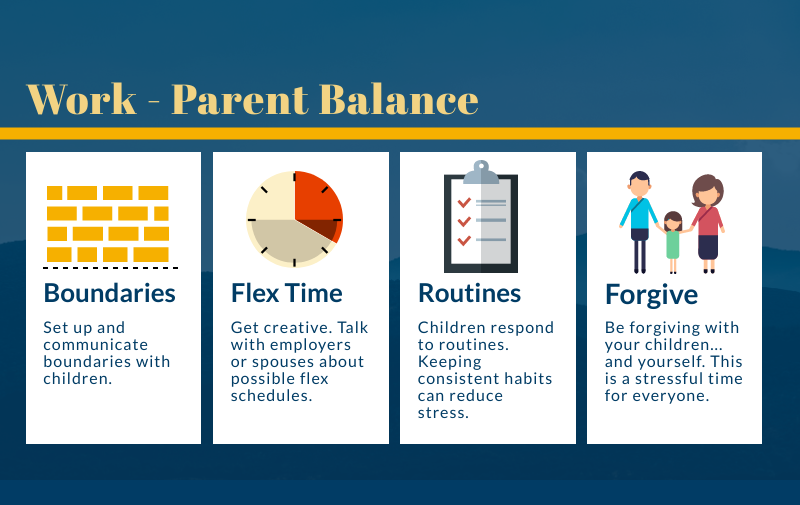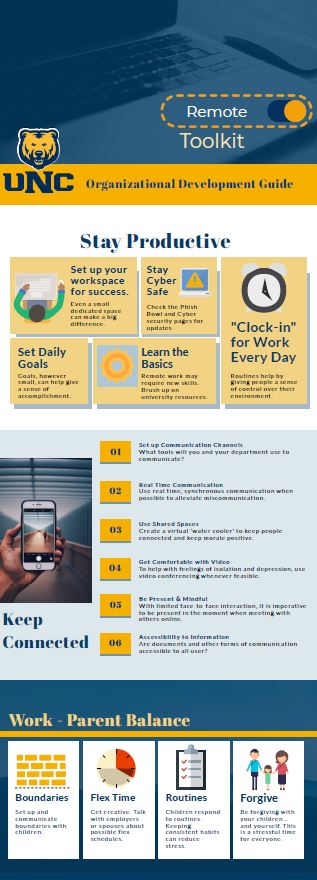Organizational Development Remote Toolkit
As life moves online, many struggle to find the resources needed. To the right, you will find an abbreviated version of tips and tricks to life online. Below, you will find a more expanded version of the infographic with resources and links to help navigate our new remote-working roles.
-
Staying Productive
First, go easy on yourself. Most employees are not used to working from home. There can be several obstacles to overcome and new systems to learn. We are all in this together.

Set up your workspace for success
- Even if it is a corner of the living room, it is important to create a dedicated space for work. Studies show it is important to separate sleeping/lounge areas from work areas. Read more from remote employees over at Buffer - "The Science Behind Why We Should Never Work from Bed."
- Check the lighting and ergonomics of your space. Can you work comfortably? This will impact your mood and productivity. What can you do to make your space feel welcoming and comfortable? CBS has some ways to help. "Cheap ways to make your work-from-home space more ergonomic..."
- What equipment do you need? Do you have everything you need? Take inventory, and check with your supervisor if you need equipment to successfully complete daily tasks.
Stay Cyber-safe
- Working remotely can add a level of security vulnerabilities that could impact your work. Make sure you've updated the password on your home WiFi network from the default settings.
- Scammers are already on the prowl. Check UNC's Phish Bowl for recent scams.
- Update your computer while working off campus. How to check for updates.
- Check UNC's Cybersecurity page for local and national information on ways to stay safe.
Punch-in for work every day
- Routines are important for success and help people feel a sense of control (especially important in times of stress). Psychology Today cites studies related to routines and your mental health: "The Power of Routines in Your Mental Health"
- Get up as you did when you worked on campus.
- Wearing "work" clothes helps create a mindset for the day. It also helps ensure you're ready to take unexpected video conference calls.
Learn the basics of your new role
Remote work takes a new set of skills. Do you feel you have the technical proficiency needed to work from home? If not, what learning paths would help? Do you have access to training you need? - Visit our Workshops and Webinars page.
EAB also created a quick guide to Running Virtual Meetings.
Set daily goals and mark progress
Going back to the importance of control, it may help to create daily goals. What can you do today to make the transition to online work easier? As you accomplish new tasks, don't forget to reward yourself. The University of California - Berkley has some advice on how to create positive career goals. "Goal-Setting: Developing a Vision..."
-
Keep Connected

Set up communication expectations and channels.
- Have you and your departments decided on which communication tools to use? And when
to use specific tools?
- Teams vs Email? Zoom vs SharePoint? Communicate with your department or teams about what communication tools you have available. Get specific about what tools should be used when.
- Set up notifications in Outlook/Teams that share with your department/colleagues when you are available and when you are offline. Be considerate of other employees' "offline" times.
- Have back-up communication tools. What happens when your WiFi goes down? Outlook, Teams and other apps are available for iPhone and Android devices.
Communicate often and in real-time (when possible).
By communicating in real-time (or synchronously), people tend to feel more connected. It can also help eliminate miscommunication because people can ask clarifying questions in the moment.
Create online connected spaces.
Part of working face-to-face is the ability for small talk. Whether it's conversations a few minutes before a meeting starts or time around the "water cooler," people develop relationships during down time. It is important to recreate those opportunities virtually.
- Leading a meeting? Take a couple of minutes at the beginning of a session to check-in with everyone.
- Create a virtual water cooler.
Get comfortable with video.
With the world going online, bandwidth can be an issue. But, if possible, share your screen:
- Many people are isolated in their homes. Video helps alleviate those feelings of isolation, which can lead to depression.
- Video can also help avoid instances of miscommunication.
- The use of video, especially in meetings, helps keep team members present and engaged.
Video Tips:
- Look at the camera, not just at the screen so people can see your eyes.
- Be aware of your framing? Are viewers looking at your ceiling?
- Be aware of your background.
- Video may not be feasible in large group conferences. It is okay to turn video off if it is overloading local bandwidths.
When meeting with people remotely, be present and mindful.
- Limit multitasking
- Pause for others to speak
- Monitor meeting chats
Don't forget to make communication channels available to all employees.
Are your meetings accessible to the employees in your team?
- Live captioning is available in Teams.
- Microsoft products include an accessibility checker to ensure documents are accessible to employees (and students).
- Have you and your departments decided on which communication tools to use? And when
to use specific tools?
-
Health Tips
We've all heard the directives from the CDC about staying healthy in the era of COVID-19.
How can you care for your overall physical and mental health? Please visit our Health UNC page for tips on staying healthy and self-care tips as we stay home and wash your hands!

-
Work–Parent Balance

Since most K-12 schools are also closed, parents are finding themselves in the unique situation of being both employees and teachers.
- The writers at The Balance Careers have 5 Tips for Parents in the era of COVID-19.
- American Association of School Librarians creates a yearly list of the best sites for educators. Many of them are free or have free trials for parents to use at home.
- NPR has a 4-minute audio clip to let you know you're not alone. Coronavirus Triple Duty...
- Are your children bored? Not to worry. The University of Central Lancashire found that boredom spurs creativity.
-
Other Resources
We've gathered a list of some resources you may find helpful to either working online or for those struggling with life in the COVID-19 era.
- The American Psychological Association's Pandemic Page
- Combating bias and stigma related to COVID-19
- Psychologists' advice for newly remote workers
- Five ways to view coverage (news) of the coronavirus
- Conducting research during the COVID-19 pandemic
- COVID-19 Education FAQ
- APA electronic resources available for distance learning
and more - this site has so many amazing resources for COVID-19.
- Colorado's Economic Center
Information for small businesses and economic relief. - Hunger Free Colorado
Listing of food banks and other food-related resources. - Violence Free Colorado
Resources for immigrants without insurance, for people with disabilities, and links to resources from the Department of Labor. - National Network to End Domestic Violence: COVID-19 Page
Information for those who may need shelter during the pandemic. - Weld County Information & Resources
- Larimer County Resources
- The American Psychological Association's Pandemic Page


